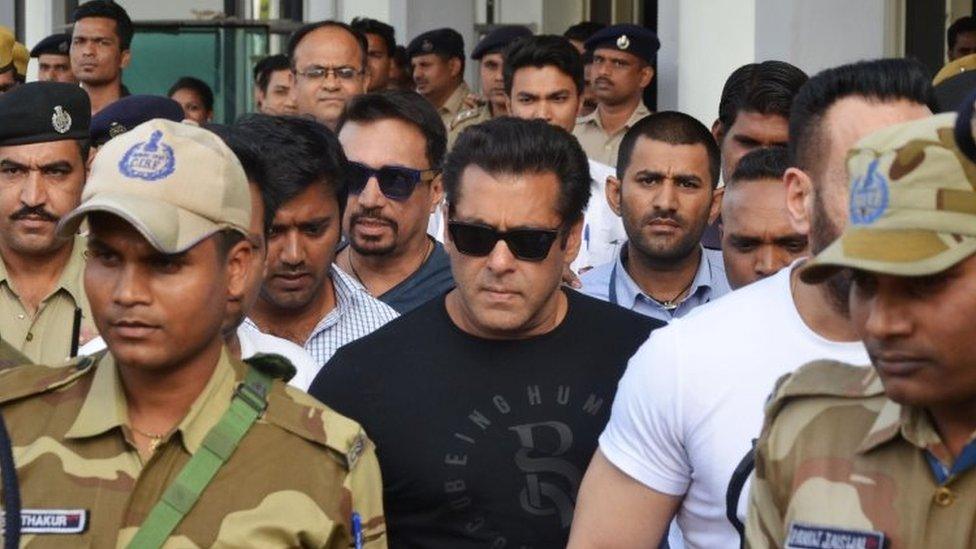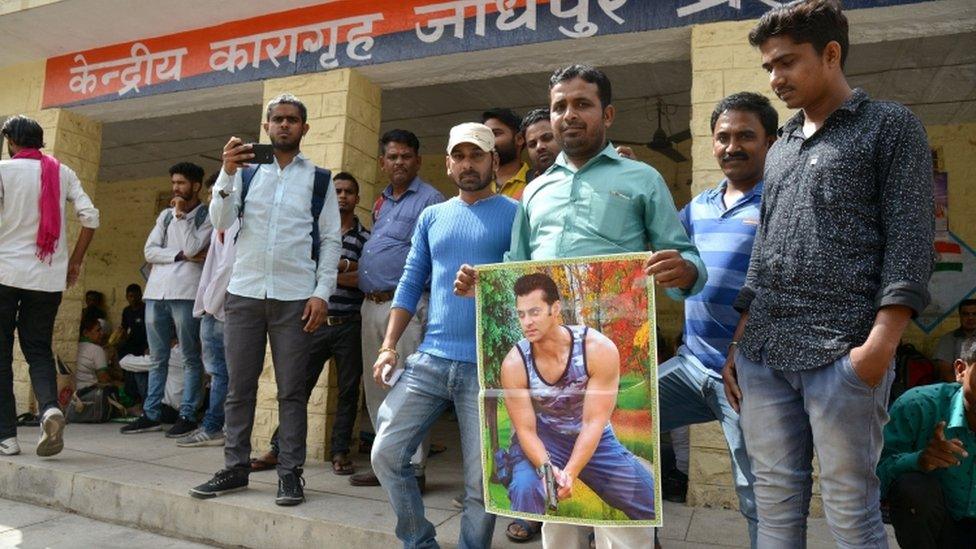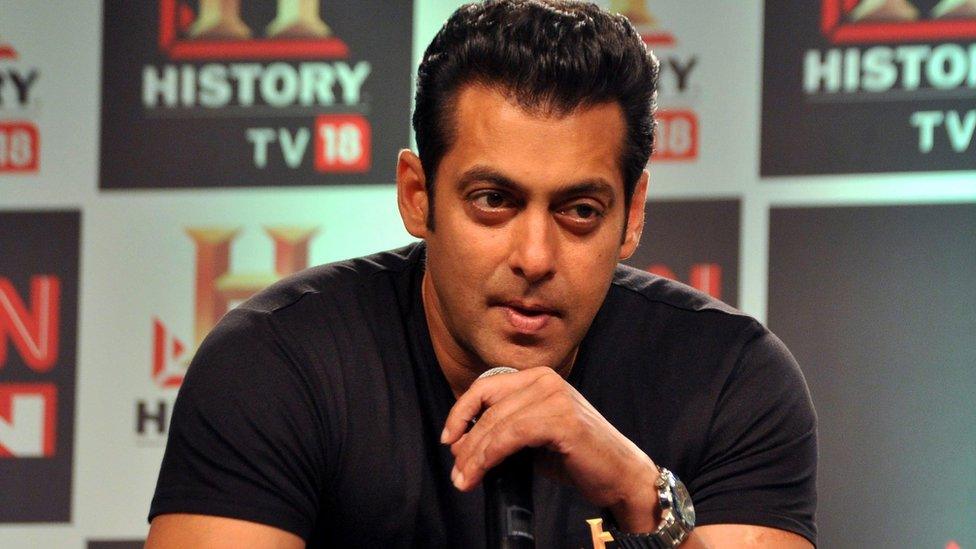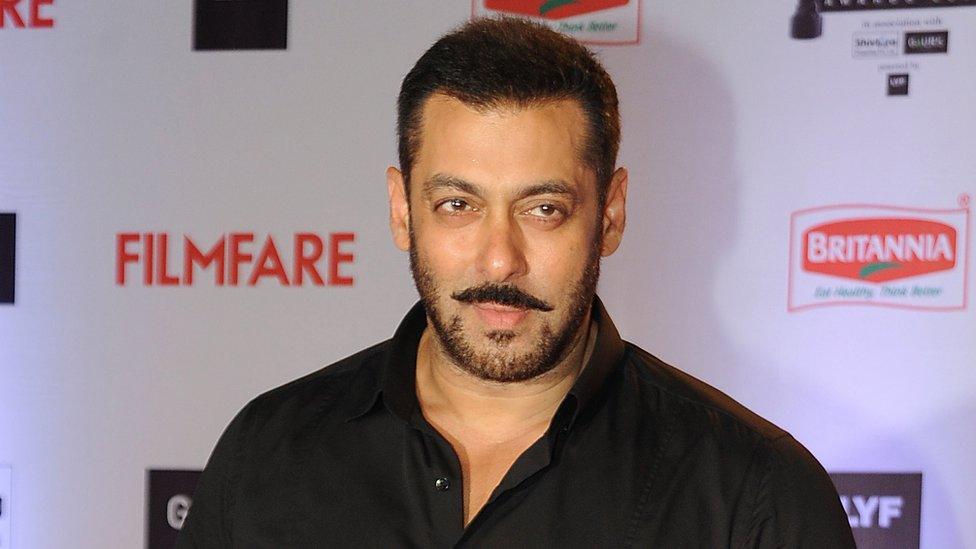Salman Khan, Bollywood superstar, bailed in poaching case
- Published

The defence had contested the reliability of witnesses
An Indian court has granted bail to Bollywood superstar Salman Khan, two days after he was jailed for poaching rare antelope back in 1998.
The defence had questioned the testing of the animals and the reliability of witnesses, NDTV reported.
On Thursday, Khan had been convicted in Jodhpur, sentenced to five years in jail and fined 10,000 rupees ($154).
The court ruled Khan, 52, killed the two blackbucks, a protected species, in Rajasthan while shooting a film.
Four other actors who starred with him in the movie and were also charged with the offence have been acquitted.
Khan, who spent two nights in Jodhpur jail, will appeal against his conviction at a higher court.
Judge Ravindra Kumar Joshi delivered Saturday's bail decision at the Jodhpur court.
Huge crowds braved scorching temperatures to gather outside the building for the ruling, the BBC's Nitin Srivastava reports from the city. They started dancing and shouted slogans once they heard the result.
Our correspondent says opinion had been divided on whether Khan should get bail, with animal rights activist arguing for a tougher punishment.
What is behind the Salman Khan case?
This is the fourth case filed against the actor in connection with poaching animals during the filming of the 1998 movie Hum Saath Saath Hain.

Fans show support outside the central jail in Jodhpur
In 2006, a trial court convicted the actor in two cases of poaching and sentenced him separately to one year and five years in prison. The Rajasthan high court suspended the sentences the following year, and eventually quashed both convictions in 2016.
The state government has appealed against that order in the Supreme Court.
Khan was then acquitted of a third case in 2017, which was for possessing unlicensed weapons used to poach the wildlife in 1998.
The original poaching complaint against him was filed by the local Bishnoi community, who revere and worship the blackbuck.
Has he been accused of anything else?
In December 2015, Khan was cleared in a 2002 hit-and-run case in which a homeless man died and four others were in injured. His car allegedly ran over them while they were sleeping on a street in the western city of Mumbai.
A lower court had convicted him in May 2015. During his trial, Khan had argued that his driver had been behind the wheel, but the judge said it was the actor who had been driving under the influence of alcohol.
Seven months later, the high court acquitted him. It said that key evidence - including testimony from a policeman who had since died - was not reliable.
In January 2017, Khan was also acquitted in another case that charged him with using illegal firearms to kill the blackbucks.
How big is Salman Khan?
One of Bollywood's biggest stars, the actor has appeared in more than 100 films and has a huge fan following across the vast spectrum of Indian society.
His fans include the middle-class English-speaking audiences as well as poor slum dwellers for whom the 350-rupee ($5.20; £3.40) tickets do not come cheap.
Known for his romantic roles as well as action films, Khan has won several prestigious Indian cinema awards.
The eldest of the three sons of well-known screenplay writer Salim Khan, he is a hit on social media too - his Facebook page is liked by more than 36 million fans, while on Twitter he has 32.5 million followers.

Is the case denting his popularity?
Rajini Vaidyanathan, BBC News, Delhi
Every day in the Mumbai suburb of Bandra, fans flock to Salman Khan's apartment building to catch a glimpse of the Bollywood actor.
I once met a group of fans who had travelled more than five hours by bus to wait in the searing heat in the hope he would wave at them from his balcony.
His films continue to draw mass audiences across urban and rural India. In a country where Bollywood is revered, Khan is one of the most worshipped.
While his time in the spotlight has attracted praise and controversy in equal measure, this latest conviction is unlikely to dent his popularity or damage his career due to the cult-like status he enjoys.
- Published5 April 2018

- Published18 January 2017
